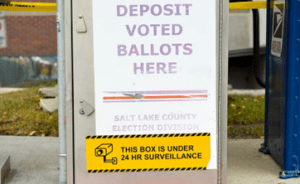It only took a few municipal elections in Utah for voters to discover how confusing, problematic (what happens when a candidate drops out during the counting phase of RCV – where do those votes go?) and complex Ranked Choice Voting truly is.
Utah’s legislature authorized a RCV pilot program that is currently under fire due to the many complaints policymakers and local government officials have heard during the first round of RCV local elections.
 One of the most egregious arguments leveled by RCV supporters is that RCV “saves” local communities money by not having to hold a primary election.
One of the most egregious arguments leveled by RCV supporters is that RCV “saves” local communities money by not having to hold a primary election.
In this case, Millcreek, Utah Mayor Jeff Silvestrini said that his suburban city has used RCV in the most recent two municipal elections and that RCV saved the city “between $80,000 and $100,000” by not having to hold a primary election.
Call us “old school” but we never thought elections should be on the chopping block to save money for a community.
Elections are one of the most important tasks local governments are tasked to do. Doing them on the cheap or eliminating primary elections with Ranked Choice Voting is just another way to invite questions and raise doubts about the outcome.
From the Salt Lake Tribune:
Senate sponsor Sen. Ann Millner, R-Ogden, championed the repeal because she said ranked voting was too confusing for voters to understand.
“I think many people, when they are asked to fill out a ranked choice voting ballot, do not really understand how they’re doing it,” Millner said. “We need to put our focus back on making sure that we are doing the right thing for our basic voting processes and that we don’t confuse people with different processes.”
This is the second year that Rep. Katy Hall, R-Ogden, has sponsored legislation to end the pilot program. Last year, her proposal died after it was held in a House committee.